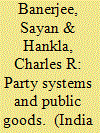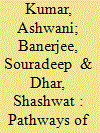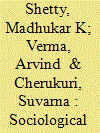| Srl | Item |
| 1 |
ID:
178069


|
|
|
|
|
| Summary/Abstract |
Political relationships and not the economic benefits of cooperation, guides India and Pakistan to take their respective stands on the hydroelectricity projects on the Indus River System. Therefore, almost all hydroelectricity projects on their shared river system have been strongly contested by one or the other riparian states. In recent years, the two countries have engaged in disputes on the Kishanganga Hydroelectricity Project on the Indian side of Jammu and Kashmir. Despite clearance by the Court of Arbitration in 2013, Pakistan raised other technical objections with the project. This article looks at India-Pakistan hydroelectricity issues, examines politics over the water and hydroelectricity projects, and analyzes difficulties in moving to a non-state centric approach.
|
|
|
|
|
|
|
|
|
|
|
|
|
|
|
|
| 2 |
ID:
178072


|
|
|
|
|
| Summary/Abstract |
We argue that two key party system characteristics – the effective number of parties and electoral volatility – have a curvilinear, inverted-U shaped, influence on public goods provision. Rejecting the linear pattern generally assumed in the literature, we contend that optimal governance outcomes will be observed at intermediate levels of party system size and stability. Only under these conditions will the benefits of competition be balanced against the risks of fragmentation. We find support for our arguments by employing new data and estimating panel models of public goods provision in 29 Indian states and territories. We hope that our findings will contribute to understanding how party systems function, particularly those at the subnational level, and will better inform how they can be leveraged for development and good governance. We also hope that they will provide some guidance about the future trajectory of public policy in the Indian states.
|
|
|
|
|
|
|
|
|
|
|
|
|
|
|
|
| 3 |
ID:
178070


|
|
|
|
|
| Summary/Abstract |
A paucity of understanding of the pathways through which money flows during elections renders all discussion on campaign finance conjectural and unpersuasive. Drawing on qualitative evidence from two assembly constituencies in Gujarat, the paper seeks to understand the “opaque” and “enigmatic” ways in which parties and candidates mobilize campaign finance and the mechanisms through which money and other goodies get channeled into the electoral process. Further, the paper also attempts to compute realistic estimates of campaign expenses under critical campaign heads and highlights the ways in which candidates bypass official spending limits set by the Election Commission. The paper’s findings speak to some of the core themes in the burgeoning scholarship on electoral integrity and political economy of campaign finance in the world’s emerging democracies.
|
|
|
|
|
|
|
|
|
|
|
|
|
|
|
|
| 4 |
ID:
178071


|
|
|
|
|
| Summary/Abstract |
Modern states have to reckon with the problem of corruption because of its derailing influence on the functioning of government. This paper argues that state–society relations frame the context in which the incidence of corruption and the state’s response to corruption become mutually reinforcing processes. We define this as “structures of irresolution” wherein an idealized abstract image of the state is constructed and corruption is blamed upon individual aberrations rather than the deviant nature of the state itself. We apply this framework to examine the functions of Karnataka Lokayukta, an anticorruption institution in India. Our data comes from the Annual Reports of this Lokayukta between 1987 and 2015 and corruption cases from Crime in India statistics. Our analysis shows that Lokayukta targeted officials disproportionately from lower sections of the bureaucracy. We recommend decentralized accountability mechanisms that redefine the relations between the individual, institutions, and the state to combat corruption effectively.
|
|
|
|
|
|
|
|
|
|
|
|
|
|
|
|